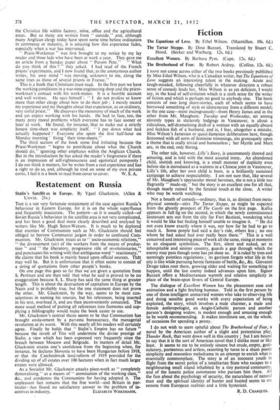Restatement on Russia
Stalin's Satellites in Europe. By Ygael Gluckstein. (Allen & Unwin. 21s.) THIS is a not very fortunate restatement of the case against Russia's behaviour in Eastern Europe, for it is on the whole superfluous and frequently inaccurate. The pattern—as it is usually called—of Soviet Russia's behaviour in the satellite area is not very complicated, and has been a good deal more clearly described and analysed by writers like Mr. Hugh Seton-Watson. It is much to be deplored that enemies of Communism such as Mr. Gluckstein should feel obliged to borrow Communist jargon in order to confound Com- munism. Mr. Gluckstein treats us to " socio-economic relations," " the divorcement (sic) of the workers from the means of produc- tion " and " the liberatory, progressive role of revolutionaries," and punctuates his writing with that ambiguous word " reactionary." He claims that his book is mainly based upon official sources. That may well be. But it is unfortunate that it often seems to consist of a string of quotations from other people's books.
On one page this goes so far that we are given a quotation from S. Perlman and are then told that what he said is proved to be no exaggeration because S. L. Sharp has said the same thing at greater length. This is about the destruction of capitalism in Europe by the Nazis and is probably true, but the one statement does not prove the other. Mr. Gluckstein, by the way, seems to be most con- scientious in naming his sources, but his references, being inserted in his text, overload it, and are then inconveniently concealed. The more usual method of putting all references into footnotes and sup- plying a bibliography would make the book easier to use.
Mr. Gluckstein's central thesis seems to be that Communism has brought enslavement by a parvenu bureaucracy, the managerial revolution at its worst. With this nearly all his readers will certainly agree. Finally he holds that " Stalin's Empire has no future " because the revolt of Tito will undermine the divine prestige of Stalin, a view which has been expressed very frequently since the breach between Moscow and Belgrade. In matters of detail Mr. Gluckstein strains one's confidence from the beginning when, for instance, he declares Slovenia to have been Hungarian before 1918, or that the Czechoslovak land-reform of 1919 provided for the dividing up of all estates over 100 hectares when in fact much larger estates were allowed.
As a Socialist Mr. Gluckstein attacks piece-work as " completely demoralising," as a means of " atomisation of the working class," &c., and condemns the Communists for having adopted it. The unpleasant fact remains that the free world—and Britain in par- ticular—has found no satisfactory answer to the problem of in-


































 Previous page
Previous page